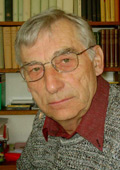Pestalozzi's Swansong (1826), shortly: 'Swansong'
Introduction
Pestalozzi's last great work was published few months before his death. It was the original intention of the author to on the one hand describe once more the idea of the elementary education in detail and conclusion and on the other hand to give a survey about his own turbulent life. According to it his acting in Burgdorf and Yverdon, where he could not consequently enough support the welfare and the education of the poor, did not correspond with his real aim of life. The only thing he acknowledges as his lasting lifework is the development of the 'idea of the elementary education'. At the end of the 'Swansong' he writes:
"Ich darf in dieser Stunde mit dem ruhigsten Ernst aussprechen: Ich bin für einige sehr bedeutende und wesentliche Teile der hohen Idee der Elementarbildung vielleicht reifer geworden, als es wenige sind und als ich es ohne die Widerwärtigkeiten und Unglücke meines Lebens selber nie geworden wäre. Ich sehe diese, wenn auch nur wenigen und nur einzelnen Resultate meines Tuns als gereifte Früchte am Baum meines Lebens noch feststehen und lasse sie mir ohne Widerstand von keinem gut oder bös gemeinten Wind so leicht von mir wegblasen. Ich sage noch einmal, diese zwar wenigen und einzelnen Früchte meiner Lebensbestrebungen sind, nach meinem innersten Gefühl, auch in ihrer Beschränkung ihrer Reifung in einem Grad nahe, daß es meine heiligste Pflicht ist, für ihre Erhaltung zu leben, zu kämpfen und zu sterben." (PSW 28, S. 286)
(At this hour I may say with the calmest seriousness: For some very important and essential parts of the great idea of the elementary education I have perhaps become more mature than there are few and than I would never have become myself without the adverseness and misfortunes of my life. I see these, even if only few and only sporadic results of my acting as ripened fruits still tightly connected with the tree of my life and do not without resistance let any well- or badly-meant wind blow them away from me just like that. I say once more, these even if few and sporadic fruits of my strivings of life, according to my innermost feeling, also despite their imperfection up to such a degree are close to their ripening that it is my holiest duty to live, to fight and to die for their preservation.)
Pestalozzi once again starts his work with the basic question about the human nature. The comparison of man with the animal confirms his basic conviction of the two sides of the human nature: what man has in common with the animal signifies his animal nature; what lifts him above the animal – his ability (which the animal does not possess) to, out of powers and talents of head, hand and heart, develop humanity, shortly: his 'spirit' -, is the higher, actual human nature. It is true that being captivated in the animal nature stays the fate of man which he should not only acknowledge, but by which he should also duly profit by animal-sensual relenting during the process of the development, but the absolute subordination of the animal below the spiritual nature is essential for the development of humanity in man. The mother, whose love to the child beyond the mere instinct is humanly developed to moral maternal faithfulness, pursues this aim since the first day of the child's life. Of course this does just not happen by subduing animal needs, but by sensitively satisfying them, for to prevent the rising of animal greediness and to secure for the child the basis of every human development of his talents, the quietness.
The following extract from the text is signified by clearness and logic in the course of thinking which suggests the renunciation of further explanations. It may only be pointed to the interesting succession of stages in the development of the powers of art, as this view of the problematic nature in no other one of the works here quoted is expressed so clearly. Like all of the other powers the powers of the hand are developed only by using them and not for example by talking or thinking about them. The development of the craft powers also cannot take place on its own, but only in connection with the intellectual development. Together with it the development of the craft powers goes through four stages: attention to rightness (searching for solutions), power of design (trying and practising), lightness and tenderness (perfecting, virtuosity) and freedom and independence (creativity). This line of development, too, however, may not be pursued one-sidedly, but must be pursued in accordance with the mental and especially the moral powers. Only this harmony in the development of the powers guarantees man its identity.
